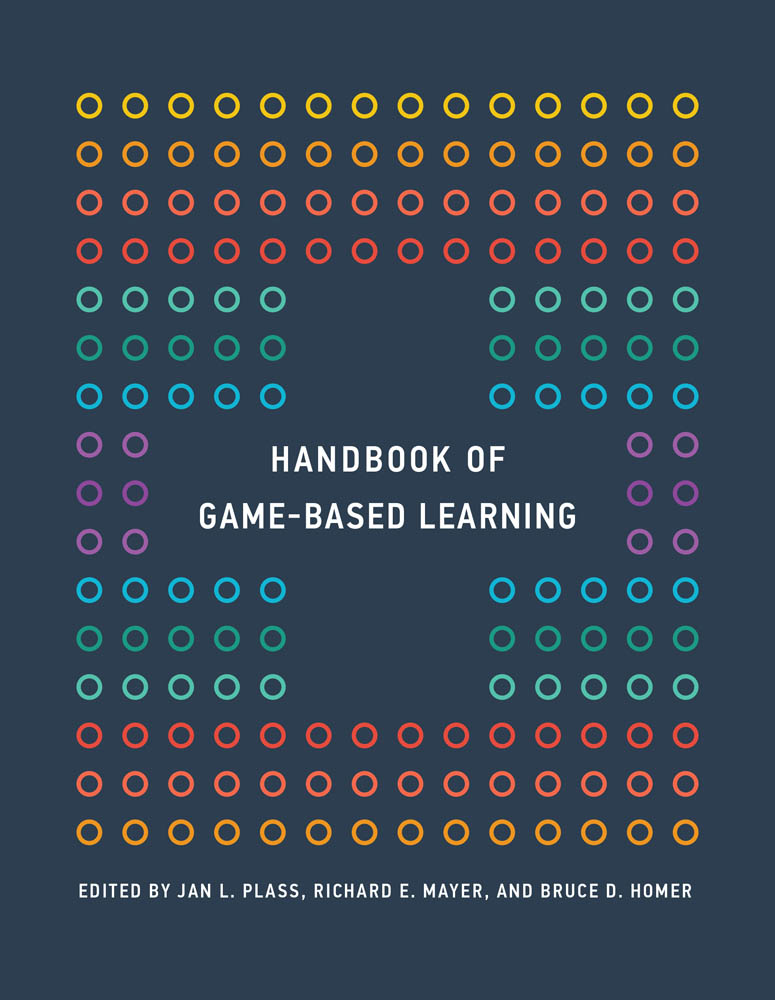The Handbook of Game-based Learning, edited by Jan L. Plass, Richard E. Mayer, and Bruce D. Homer, is a comprehensive introduction to the latest research and theory on learning and instruction with computer games.

Editors
Jan L. Plass
Jan L. Plass is Professor of Educational Communication and Technology and the inaugural holder of the Paulette Goddard Chair of Digital Media and Learning Sciences in the Steinhardt School of Culture, Education, and Human Development at New York University
Richard E. Mayer
Richard E. Mayer is Distinguished Professor of Psychological and Brain Sciences at the University of California, Santa Barbara.
Bruce D. Homer
Bruce D. Homer is Professor of Educational Psychology and Human Development at the Graduate Center of City University New York.
Table of Contents
Part 1 Introduction to Game-Based Learning
Chapter 1 Theoretical Foundations of Game-Based Learning
Jan L. Plass, Bruce D. Homer, Richard E. Mayer,
and Charles K. Kinzer
Chapter 2 Play and Cognitive Development:
Bruce D. Homer, Charles Raffaele, and Hamadi Henderson
Chapter 3 Types of Engagement in Learning with Games
Ruth N. Schwartz and Jan L. Plass
Part 2 Theoretical Foundations of Game-Based Learning
Chapter 4 Cognitive Foundations of Game-Based Learning
Richard E. Mayer
Chapter 5 Affective Foundations of Game-Based Learning
Kristina Loderer, Reinhard Pekrun, and Jan L. Plass
Chapter 6 Motivational Foundations of Game-Based Learning
Richard M. Ryan and C. Scott Rigby
Chapter 7 Socio-Cultural Foundations of Game-Based Learning
Constance Steinkuehler and A. M. Tsaasan
Part 3 Design Foundations of Game-Based Learning
Chapter 8 Instructional Support, Feedback, and Coaching in
Game-Based Learning
James C. Lester, Randall D. Spain, Jonathan P. Rowe,
and Bradford W. Mott
Chapter 9 Self-Regulation and Reflection in Game-Based Learning
Michelle Taub, Amanda E. Bradbury, Nicholas V. Mudrick,
and Roger Azevedo
Chapter 10 Adaptivity and Personalization in Game-Based Learning
Jan L. Plass and Shashank Pawar
Chapter 11 Narratives in Game-Based Learning
Michelle D. Dickey
Chapter 12 Multimedia Design Principles in Game-Based Learning
Brian Nelson and Younsu Kim
Chapter 13 Collaboration and Cooperation in Game-Based Learning
Fengfeng Ke
Chapter 14 Emerging Design Factors in Game-based Learning:
Emotional Design, Musical Score, and Game Mechanics Design
Shashank Pawar, Frankie Tam, and Jan L. Plass
Chapter 15 Emerging Design Factors in Game-based Learning:
Incentives, Social Presence, and Identity Design
Frankie Tam and Shashank Pawar
Part 4 Applications of Game-Based Learning
Chapter 16 Game-Based Learning in Science, Mathematics, Engineering,
and Technology
Eric Klopfer and Meredith Thompson
Chapter 17 Games as Language Learning Environments
Jonathon Reinhardt and Steven L. Thorne
Chapter 18 Games for Training of Cognitive Skills
Daphne Bavelier
Chapter 19 Games for Workforce Learning and Performance
Ruth C. Clark and Frank Nguyen
Chapter 20 Games for Assessment
Valerie J. Shute & Chen Sun
Chapter 21 Learning Analytics for Games
V. Elizabeth Owen and Ryan S. Baker

Pingback: All You Can ET, A game to train Cognitive Flexibility - Gedankenspiele
Pingback: CrushStations, a Game to Train Working Memory - Gedankenspiele